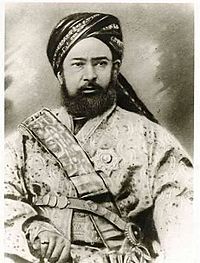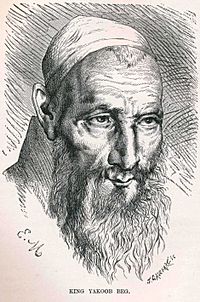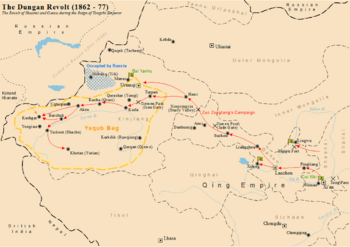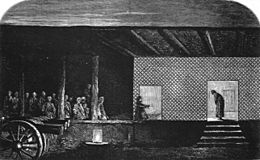Yaqub Beg facts for kids
Quick facts for kids
Yaqub Beg
|
|
|---|---|
 |
|
| Born | 1820 Piskent, Khanate of Kokand (now Uzbekistan)
|
| Died | May 30, 1877 |
| Occupation | Amir of Yettishar |
Muhammad Yaqub Beg (born 1820 – died May 30, 1877) was an important leader from the Khanate of Kokand. He became the ruler of a region called Yettishar (also known as Kashgaria) in Central Asia. This happened when he led an invasion of Xinjiang between 1865 and 1877. He was known by the special title Atalik Ghazi, which means "Champion Father."
Contents
Early Life and Career
Yaqub Beg was born in a town called Piskent, which was part of the Khanate of Kokand (now in Uzbekistan). His father, Pur Muhhammad, was a judge.
As a young man, Yaqub Beg tried different jobs. He was sent to Tashkent to become a weaver, but he found it boring. He then worked for local leaders and generals. He quickly became good at military and political tasks.
He gained power and wealth. He was involved in many changes and rivalries within the Khanate of Kokand. He was even promoted to a military officer with the title Baturbashi.
The Qipchaq Massacre
In 1852, a leader named Muhammad Khudayar Khan wanted to stop the influence of a group called the Qipchaqs in the Khanate's politics. Many Qipchaqs were killed during this time. Yaqub Beg's exact role in these events is not fully clear. After this, he helped defend the city of Tashkent when the Russians first attacked it in 1864.
Taking Control of Xinjiang
First Attacks (1865)
During the Dungan Revolt (1862–77), Chinese control over parts of Xinjiang weakened. By 1864, the Chinese only held a few strongholds.
In January 1865, Yaqub Beg left Kokand with a small group of men. He joined forces with Burzug Khan, a son of another leader. They crossed into China. Yaqub Beg quickly showed his military skills. He defeated other local leaders and armies. He even convinced some of his enemies to join him.
He besieged the Chinese at Yangi Hissar and took control. He then moved towards Yarkand, a large town. After some fighting, Yarkand surrendered to Burzug Khan and Yaqub Beg. Many soldiers joined Yaqub Beg's side.
However, Burzug Khan and Yaqub Beg soon had a disagreement. Yaqub Beg defeated Burzug Khan's supporters. Burzug Khan was then captured and later exiled. In just over a year, Yaqub Beg became the master of important cities like Kashgar, Yarkand, and Maralbashi. This region stretched across the western part of the Tarim Basin.
Later Rule
Yaqub Beg tried to make agreements with the Russian Empire and Great Britain. He hoped to get their support for his new state, but he was not successful. In 1866, the Amir of Bokhara gave him the title "Athalik Ghazi, Champion Father of the Faithful." The Ottoman Sultan also recognized him as an Amir.
How People Felt About His Rule
Yaqub Beg's rule was not very popular among the local people. They faced heavy taxes and strict Islamic laws. Some locals even said that things were better when the Chinese were in charge. Trade also became difficult.
A historian named Kim Hodong noted that the local people were happy when Chinese troops returned. A Chinese general, Zuo Zongtang, wrote that Yaqub Beg's forces were harsh on the people. He believed that government troops should be kind and fair.
Death
The exact way Yaqub Beg died is not fully clear. Some reports say he died after a short illness. Other sources suggest he was poisoned on May 30, 1877, in Korla. This might have been part of a plan with the Qing dynasty forces. Some accounts also say he was killed in battle with the Chinese.
The exact date of his death is also debated, but it is believed to be in late May 1877. After his death, his sons and grandson were given life imprisonment, but they were provided with money for their support.
Legacy
Yaqub Beg is still remembered today. Some people, like politician Rebiya Kadeer, have praised him. A son of general Yulbars Khan was named after Yaqub Beg. He also appears as a character in the novel Flashman at the Charge.
See also
- Xinjiang under Qing rule
- Dungan Revolt (1862–77)
- Qing reconquest of Xinjiang
Images for kids
 | Calvin Brent |
 | Walter T. Bailey |
 | Martha Cassell Thompson |
 | Alberta Jeannette Cassell |








